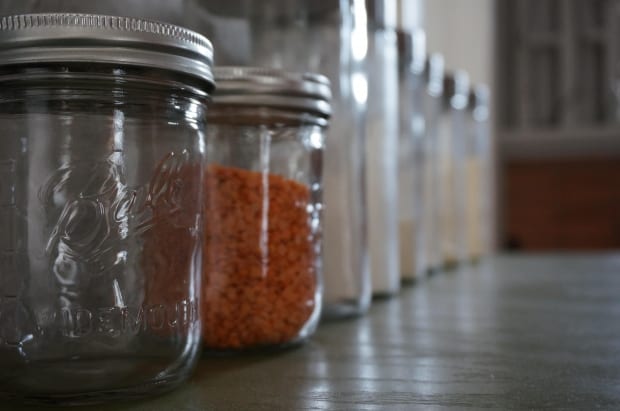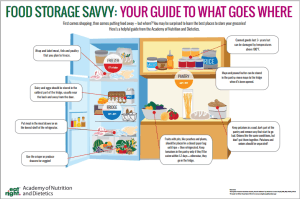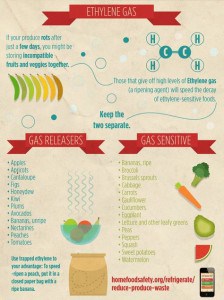Food waste directly impacts the global economy, uses up valuable resources such as water, and produces greenhouse gas emissions. Proper food storage can reduce food waste, save money, and have a positive impact on the environment! Triple win.
A clean, organized refrigerator makes it easy to see what you have, simplifies meal planning, and reduces the chance something will spoil or expire. When it comes to organizing your fridge and pantry be sure to follow the “first in, first out” rule, abbreviated as “FIFO”. Whenever you purchase new foods be sure to move the older items to the front so they will be used first.
Food Storage Resources:
⇒ For optimal food quality and safety, where you store your food matters. This infographic from eatright.org is a great resource to help guide you when it comes time to put away your groceries.
⇒ This handy resource: Storing Fresh Fruits and Vegetables for Best Flavor from FruitsAndVeggiesMoreMatters.org offers great tips for storing produce! Though I would store mushrooms in the cardboard container they come in or a brown paper bag, not plastic for optimal freshness.
⇒ Want an A-Z guide for storing your food? Look no further because Eureka Recycling has created this super informative, easy-to-read guide. I love and reference it often.
Food Storage Tips:
Ethylene Gas:
One way to help keep your produce fresh is to store high ethylene producing fruits and vegetables away from ethylene-sensitive foods. Why? Because ethylene gas is a ripening agent and can speed up the natural ripening of your produce.
Ethylene Gas Producing:
- apple
- apricot
- avocado
- banana
- cantaloupe
- fig
- honeydew
- kiwifruit
- nectarine
- peach
- plum
- tomato
Ethylene Gas Sensitive:
- banana
- broccoli
- brussels sprout
- cabbage
- carrot
- cauliflower
- cucumber
- eggplant
- lettuce and other leafy greens
- peas
- peppers
- squash
- sweet potato
- watermelon
This chemical reaction can also be used to your advantage. For example, if you have an under-ripe avocado you can place it in a paper bag which will trap the ethylene gas and speeds up the ripening process. Or if you have under-ripe tomatoes, place these with a banana in a brown bag, close-able jar, or cardboard box to speed up ripening.
Another great infographic (yes, I am slightly obsessed with infographics right now) from homefoodsaftey.org.
Use the Freezer:
Whether you intentionally buy extra fruits and veggies to freeze for later or wind up with produce you know you won’t get to before it goes bad, freezing fruits, veggies, and even herbs is a fantastic way to keep your produce out of the trash.
Frozen fruit can be used in smoothies, baking, and cooked to create a delicious fruit compote.
Frozen vegetables can be steamed, added to soups, stews, smoothies, and stir fries.
When it comes to greens like spinach and kale you can add these to a blender with some water, blend, and add mixture into ice-cube tray and freeze. Once the cubes are frozen, pop them out, place in a zipper-lock freezer bag and store in the freezer. These frozen greens cubes are great in smoothies or soups.
Preserve herbs before they spoil by turning them into ice cubes. Add chopped up herbs to an ice cube tray, top with oil, water, or vegetable broth. Once the cubes are frozen, pop them out, place in a zipper-lock freezer bag and store in the freezer.
Here’s to saving more and wasting less!



